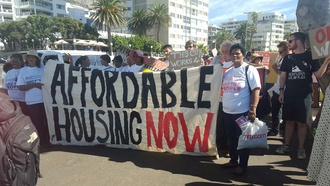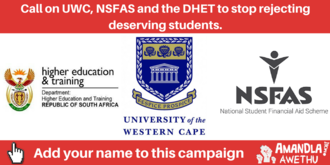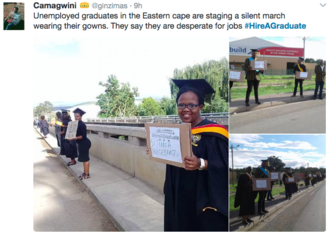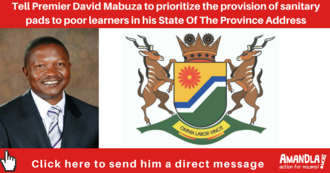- Featured
- Clean air
- Climate justice
- Consumer Rights
- Corporate Accountability
- Data access
- Early Childhood Development
- Economic fairness
- Education
- Electoral fairness
- Environmental justice
- Food justice
- Gender based violence
- Grants/social assistance
- Health
- Housing and infrastructure
- Industry interference
- Land Justice
- LGBTQIA+ rights
- Media/ information access
- Public transport
- Racism
- Reparations
- Safety
- Sanitation
- Service Delivery
- Sexual and Reproductive Rights
- Social justice
- Unemployment
- Womxn's rights/ gender equality
- Workers' rights
- More
-
Prioritize housing and land needsAs residents from Freedom Park, south of Johannesburg, we marched on 20 March 2017 to the ANC headquarters, in a bid to demand the rights to occupy vacant land on the outskirts of the area in which we live. With the ANC set to hold a policy conference in June to discuss, among other issues, how to expropriate land for the benefit of communities as tabled in its Strategy and Tactics Discussion Document, we call on you to stand in solidarity with all landless people across South Africa by supporting this campaign. “We have been living in Freedom Park as tenants for almost all our lives. None of us here owns any land. All we are asking for is for government to give us some piece of land, and we will build our own shacks.” “We are members of the ANC, and we trust it to listen to our cries. All we want is land.” We have adopted this Eleven Points Program for Freedom Park Backyard Dwellers to advance the fight for decent and habitable housing for all. 1. Occupy land and erect structures for as long as there is a backlog of decent Housing for all. 2. Resist evictions and fight not to be evicted or be moved to other places where we do not wish to live. 3. Fight for closing down of all municipal anti-land invasion units and all private eviction squads, such as the Red Ants, that municipalities outsource this function to. 4. The struggle of the Marikana occupiers in Philippi (Cape Town) is a victory for the landless people of Azania and it must be defended. The Marikana occupation and struggle in Philippi has resulted in a Constitutional Court decision that it is unlawful for anti-land 'invasion' units to knock down a structure or structures that have been built by occupiers as a home to live in, regardless of how long the structure has stood or whether there is furniture in it. 5. Occupations are a legitimate means for us to survive poverty and unemployment and speed up the process of land redistribution that the government promised but continues to fail to deliver. 6. We note that even under the so-called democratic dispensation the state continues to uphold the property rights of the rich, while the poor are expected to rot away under intolerable living conditions. 7. We reject the state's zero tolerance policy on occupations that is enforced by municipalities, the police and the courts. It is a contradiction to talk about “land reform” – as the government has again been doing recently – while at the same time denying people’s right to occupy land and punishing them if they do. 8. We note that over many decades of forced removals and pass laws the Black masses in occupied Azania, in defiance of apartheid, won the right to occupy land and build structures/shacks. This must be defended and extended in order to ensure adequate and just land redistribution for the landless Black masses dispossessed of their land through colonialism and apartheid. 9. Today, those who occupied land prior to 1994 are not threatened with eviction; while those who occupy today face the state’s harsh and repressive zero tolerance policy on occupations. We reiterate that it is a contradiction for the state to talk about land reform and yet deny people the right to occupy the land of their ancestors and birth. 10. This makes a mockery of the new democracy and effectively criminalizes our struggle for decent and habitable Housing. 11. By failing to address the housing crisis, by allowing the appalling conditions that people face daily and by failing to provide decent and habitable housing for all the state and it's functionaries are the real ‘criminals’. Those who occupy land and struggle to improve their living conditions are guilty of nothing other than pursuing the rights the Constitution and government have promised them.47 of 100 SignaturesCreated by Amandla.mobi Member
-
Send a message to the Fees Commission*Our leaders had a year to meet the demands of Fees Must Fall, and they have failed. But we have an opportunity to change this. This time last year we didn't have the ‘no-fee’ varsity report released, or had commitments from government to address illicit financial flows, but this year we do. That’s why we are calling for Minister Nzimande to stop stalling and implement his own no-fee varsity report, and for Minister Gigaba to commit at least 1% of Mzansi’s GDP to higher education. In October 2015, thousands of amandla.mobi members rallied together and forced Minister Nzimande to release the No-Fees Varsity Report. The report sets out 12 recommendations showing how free university education for students from low income households can be provided [1]. This affirms the demands of the student movement collectively known as ‘Fees Must Fall’ and proves that the Minister can take decisive action to put an end to financial exclusion in higher education. Since the release of the report we have been pushing to shift the public debate towards calls for Minister Nzimande to progressively implement the recommendations of the report. The time to stop overlooking us has come! Academics have spoken out on the chronic underfunding of Mzansi’s universities [2]. In fact, Mzansi’s government spends below the continent’s average on higher education, at 0.75% of its GDP. The proportion of GDP for Senegal and Ghana is 1.4% [3]. Mzansi’s higher education budget for the 2015/16 financial year is R30 billion. If the government were to spend 1% of GDP on higher education, this would amount to R41 billion. That’s almost four times the reported shortfall caused by 2016’s freeze on fee increases [3]. The recommendation by the Department of Higher Education and Training that university fees for 2017 should not be increased by more than 8% is in stark contrast to the events of last year where the government instructed universities on what to do. It is an open invitation for universities to determine what margin they increase fees by, provided that they remain within the Minister Nzimande’s recommendation. We need to shift the focus back to addressing the chronic underspending on the country’s universities. [1] It’s a national crisis, academics tell Nzimande, News24. Oct 22, 2015. [2] Free education is possible if South Africa moves beyond smoke and mirrors, Salim Vally for The Conversation. Sep 21, 2016. * The information you submit will be sent to the Fees Commission, the Presidency and the Department for Higher Education.323 of 400 SignaturesCreated by Amandla.mobi Member
-
Prioritize social housingToday we announce that we have embarked on a symbolic occupation of the Helen Bowden Nurses Home and the Woodstock Hospital to demand Urban Land Justice in Cape Town. We are Cape Town residents from across the race and class divide. We are residents of Woodstock, Sea Point, Marikana informal settlement, Blikkiesdorp and Khayelitsha. We are from communities at the forefront of the housing and segregation crisis in our city. We stand in solidarity with the struggles of all poor and working class people who still live homeless under bridges; in shacks and informal settlements at the edge of our city; in backyards and wendy houses on the Cape Flats; and in store rooms and domestic quarters in former white suburbs. The colonial and apartheid governments divided our city, controlled where we could live and forcefully removed our families from their homes. Our parents and grandparents resisted and overcame racial oppression. They fought for the rights to dignity, justice, equality, and adequate housing that our Constitution now guarantees. But we still experience the violence of apartheid spatial planning and segregation. A dignified life with access to good services and decent work is reserved for a few. We still experience violent evictions from our homes by private property owners and our government. This, while private landlords, developers and banks are making obscene profits. Land must be for people, not for profit. We are angry that our City, our Province and our National governments have failed to acknowledge our struggles for land and for affordable housing. They have failed to bring Black and Coloured people back into our city. We believe that symbolic and peaceful civil disobedience is now justified in the defence of our Constitution and our Constitutional rights. As we have now made our home here for over 48 hours, the law is clear that we may not be evicted without an order of court. We call on the Province and the South African Police Service to act lawfully and refrain from using violence or other tactics of state oppression against us.37 of 100 SignaturesCreated by Amandla.mobi Member
-
Glenmore community demands answers!The people of Glenmore want to exercise their rights and have realised that for Glenmore to develop they need to rise up as a community and demand to be taken seriously. Services rendered should be done as per specifications, should be time bound and someone must account for work done that is below the specified standard. Black contractors appointed by the municipality should ensure that their work leaves a lasting legacy for generations to come and not to produce a "final product" that will need to be demolished/redone in a short period. Black business should strive for excellence, positioning them for leadership. Proper social facilitation should be the cornerstone for any and all community development projects. We can improve service delivery and fight corruption in our Municipality by ensuring all Service Delivery Agreements (SDAs) are public and easily accessible to all. Communities need not resort to violent protest. Transparency now!189 of 200 SignaturesCreated by LINDOKUHLE VELLEM
-
Assist Students Depending on NSFASThe University of the Western Cape Financial aid office is deliberately declining NSFAS funding for senior students who have passed 50% or more of their 2016 modules. According to NSFAS website and press releases, all students who were funded in 2016 and have passed 50% or more of their 2016 modules qualify for funding. The University of the Western Cape is saying otherwise. On 6 February 2017 Universities South Africa (USAf) issued a statement saying "students at all universities may be assured that notwithstanding the challenges experienced by NSFAS, the vast majority of students who qualify for grants will be able to register this week if they have not already done so." Fast forward to 21 March 2017 and there are confirmed cases of students at the University of Western Cape (UWC) and Durban University of technology (DUT) who are yet to register despite meeting the criteria to qualify for NSFAS. According to a commitment made by NSFAS in 2017, all first-entry students who have applied for financial aid and who come from Quintile 1, 2 and 3 schools (least privileged schools) and / or where family income is dependent upon a South African Social Security Agency (SASSA) grant, qualify for financial aid. These students may, with minimal risk to universities, be admitted to the study programme for which they qualify (subject to availability of space), and also to a place of residence (subject to capacity considerations). With regard to returning students, NSFAS has undertaken to support in 2017, all students who: * Received financial aid in 2016; * Satisfied the 50% module pass requirement; * Satisfy the N+2 completion requirement; and * Have signed their 2016 NSFAS loan agreement forms.129 of 200 SignaturesCreated by Amandla.mobi Member
-
SA Says NO to Monsanto's bogus drought tolerant GMO maize and toxic glyphosateWe are deeply troubled by the continuous introduction of risky GMOs into our food and farming systems. Since its introduction into our food system in 1998, it has done nothing to address our nation’s hunger problems. Instead, we are left with polluted soil and water and loss of our superior, local farmer-bred varieties of maize. We are also extremely concerned about the political economy of seed control that Monsanto has imposed on our seed system, which utterly undermines our food sovereignty and breeds a dependency on Monsanto's industrial systems and technologies. Local land belonging to smallholder farmers in SA have already been contaminated. More GMOs will only exacerbate this situation and further erode farmers’ seed systems. We call on our government to reject Monsanto’s application and begin a real dialogue with South Africans to transition out of industrial and GM-based agriculture systems and work towards real climate resilient solutions that are ecologically sustainable, socially just and takes care of the nutritional needs of all South Africans23,634 of 25,000 SignaturesCreated by African Centre for Biodiversity

-
Allan Gray, Net1 Hands Off Our GrantsAllan Gray who, through various accounts, holds 15.6% of the issued shared capital of Net1. Allan Gray, similarly to other asset managers, has a publically available policy on how it incorporates sustainability considerations, such as environmental, social and governance issues, into its investment decision-making. Among the factors it lists, as being taken into account when making investment decisions, are the corporate culture and ethics of the companies it invests in. This is interesting given the unethical nature in which Net1 has been stealing from the poor through deductions made from social grant recipients. Most asset managers forget that they are the custodians of the savings of many South Africans who would be appalled to know that they own shares in Net1 which, it appears, exploits the poorest strata of society to make a profit. The Sassa saga was an opportunity for Allan Gray and other owners of Net1 to stand up and intervene in the manner in which the situation was handled by Net1 and in the pricing strategies it deployed. They might not be able to change the business model of Net1 through shareholder activism alone. They can, however, choose not to hold its shares, based on ethical considerations. If more shareholders followed this approach Net1 would be forced to change its business model. 17 The Sassa saga is more than a failure of government to look after the interests of the poor. It is a failure by corporate South Africa to do the same. Reference: Sassa Saga: How CPS cross-sells microloans, insurance and services to poor grant recipients, Magda Wierzycka for The Daily Maverick. March 7, 2017.249 of 300 SignaturesCreated by Amandla.mobi Member
-
Tobeka Daki Campaign for Access to TrastuzumbSwiss multinational company Roche is facing global condemnation from women living with cancer, families of people with cancer, activists, scientists, researchers and health professionals from across the world who demand that no woman go without it lifesaving breast cancer treatment because it is too expensive. On 7th February, the Fix the Patents Laws Campaign launched the Tobeka Daki Campaign for Access to Trastuzumab in loving memory of a fearless activist who lead the struggle to ensure access to breast cancer treatment for women in South Africa. Despite being prescribed trastuzumab, a WHO essential medicine for the treatment of HER2+ breast cancer, Tobeka was never able to access the treatment due to its high cost. In South Africa the annual price in the private sector is around ZAR 516,700. The few public facilities which can access trastuzumab do so at a lower price of around ZAR 211,920 per year. Both out of reach of most. But, health economists have shown that a year’s worth of trastuzumab can be produced and sold for around ZAR 3 400. Drastically less. This estimated price even includes a 50% increase above the cost of production for profit. Meanwhile Roche are posting fat profits. In 2015 Roche made US$ 8.9-billion profit (around 119 billion Rand). In the same year CEO Severin Schwan earned US$ 12-million (around 160 million Rand). It seems highly plausible that Roche could cut the price of trastuzumab dramatically and still be very profitable. Instead Roche maintains it’s high prices in any way possible. Roche holds multiple evergreened patents on trastuzumab in certain countries across the world. In South Africa, for example, multiple patents extend their monopoly until 2033. In countries where the patents have ended or do not exist, Roche is using other means to block potentially more affordable biosimilar versions coming to market. In India Roche have initiated a court challenge against the Indian regulatory body for its decision to approve Mylan’s version as a biosimilar product. In Brazil and Argentina, Roche is one of the pharmaceutical companies litigating against those governments for their attempts to use legal international safeguards to protect public health. For too long Roche has been allowed to charge exorbitant prices for these lifesaving treatments. Tobeka had one life. Her two children had one mother. We had the means to give her a chance at survival and we failed her – as we will continue to fail other women. Shame on Severin Schwan (Roche CEO) for insisting on fat profits while you could save lives by trimming your profits. Roche could have given Tobeka a chance, but instead they turned their back on her. Demand that Roche do not turn their back on all the other women across the world. #RocheGreedKills #ForTobeka www.fixthepatentlaws.org160 of 200 SignaturesCreated by Amandla.mobi Member
-
Amend legislation that negatively impacts communitiesThe granting of fishing allocations makes small-scale farming entities and communities susceptible to bullying by established entities. This further perpetuates the poverty cycle with small-scale entities giving in to capital. We need to put in place sustainable models and policies that help small-scale entities thrive. We have seen how entities granted fishing allocations struggle with no guarantee of any form of tenure. This is made evident by the recent case of Buffeljags, on the Western Cape's Overberg coast and many others. Given the high poverty levels in South Africa, and with the current policies in place, small-scale farming communities will always be on the back foot and capital will always reign supreme. We must go back to the drawing board and rectify policies. The Buffeljags is a small community who rely on harvesting seaweed to make ends meet. The Department has not renewed their 10-year fishing allocation and this will plunge the community into poverty. We can't allow a government department to make decisions that negatively impact the poor.9 of 100 SignaturesCreated by Amandla.mobi Member
-
Hire a graduate, even if they don't have experienceWe can't get jobs because we lack experience, we are suffering.1,201 of 2,000 SignaturesCreated by Phumelele Hlongwane
-
Prioritize sustainable provision of sanitary pads in quintile 1-3 schools in MpumalangaOn average in Mzansi. a girl will miss 60 days of school because of her period [1]. And some are forced to use socks, newspapers and worse because they can’t afford sanitary pads. Over time this can cause girls to drop-out completely. If they struggle through, they often find themselves unable to fully take part in school activities. Last year, we watched as Parliament introduced Max, the flavoured condoms. While efforts aimed at reducing the rate of HIV/AIDS are commendable, we cannot ignore the plight of the girl child who loses her dignity and time for her studies for something she cannot opt out on. “You have to enable that child to go to school every day because the concern is that women are illiterate. If (not having access to) sanitary towels make girls not go to school, it should be your primary concern” ANC MP Patricia Chueu. [1] Dignity Dreams article with information on how many girls miss school a month and in a year: http://www.ngopulse.org/organisation/dignity-dreams5 of 100 SignaturesCreated by Amandla.mobi Member
-
Prioritize sustainable provision of sanitary pads in quintile 1-3 schools in the Northern CapeOn average in Mzansi. a girl will miss 60 days of school because of her period [1]. And some are forced to use socks, newspapers and worse because they can’t afford sanitary pads. Over time this can cause girls to drop-out completely. If they struggle through, they often find themselves unable to fully take part in school activities. Last year, we watched as Parliament introduced Max, the flavoured condoms. While efforts aimed at reducing the rate of HIV/AIDS are commendable, we cannot ignore the plight of the girl child who loses her dignity and time for her studies for something she cannot opt out on. “You have to enable that child to go to school every day because the concern is that women are illiterate. If (not having access to) sanitary towels make girls not go to school, it should be your primary concern” ANC MP Patricia Chueu. [1] Dignity Dreams article with information on how many girls miss school a month and in a year: http://www.ngopulse.org/organisation/dignity-dreams2 of 100 SignaturesCreated by Amandla.mobi Member
.png)

.png)



.jpg)





